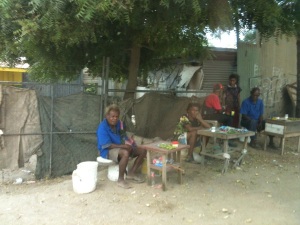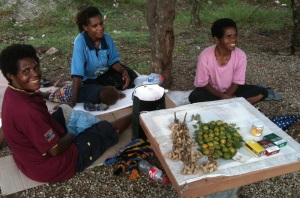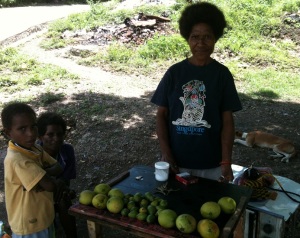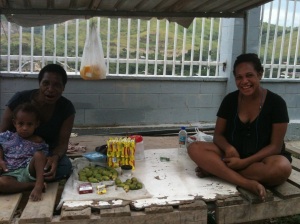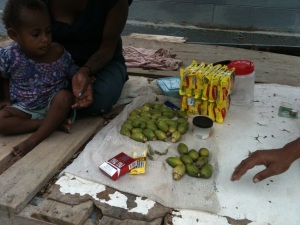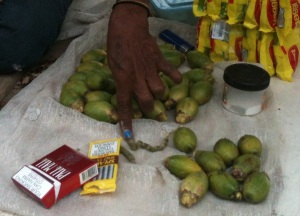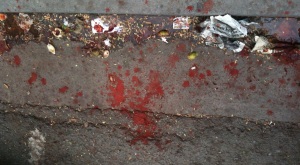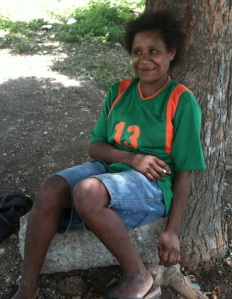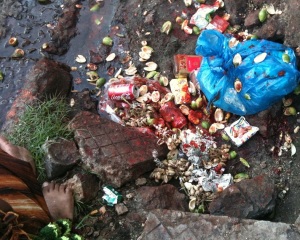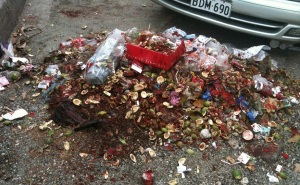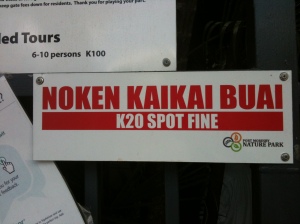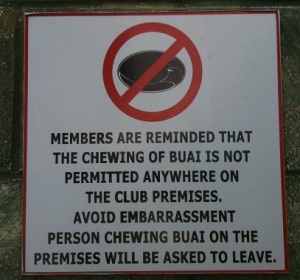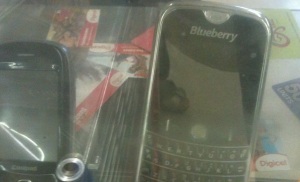Greetings from Port Moresby! Here is a nice photo that I took this week of the port from which this town draws its name. I suppose technically, Moresby (as it is usually called here) is a city. But with a population of only 308,000 or so, it’s really more of a large town than a city. Although, it’s all a matter of perspective. I met a chap from Vanuatu this week who was most excited to be in Port Moresby because he considered it the big smoke in comparison to his own little island (as he described it).
Life is good here in PNG. I am feeling better after my little mishap last weekend, but I am still restricted in a few ways – primarily in my weightlifting. Other than that, I have no complaints.
I enjoy watching the traffic in the harbour from the windows of some of the offices that I visit. This ship arrives in port each Tuesday, carrying a load of used cars from Japan. There is a deliberate effort on the part of the government here to limit the number of cars being imported because the road infrastructure is already so stretched. There is no highway linking the country North to South. Just sections of highway along the coast and thereabouts.

One of the first things that one notices after arriving in PNG is the prevalence of betel nut. Areca nut (commonly referred to as betel nut), is a popular drug that is widely used in this part of the world. The nut comes from the areca palm (Areca catechu), and it is heavily consumed from Pakistan eastwards, right through South-East Asia all the way to Papua New Guinea. Here they called it “Buai” [pronounced boo-eye]. I also saw many people using betelnut when I lived in East Timor in 2000-2001. There is archaeological evidence that betel nut has been consumed in South-East Asia for at least 4,000 years.
One positive outcome of this rather unsavoury habit is that it creates some employment for women. Often the stalls around town are staffed exclusively by females. The buai costs 1 kina per nut here (50 cents). So by selling them at a small profit, women can eke out an existence.
I bought some mangoes today from a woman who was also selling betelnut. She had asked her son to collect some mangoes this morning and had just laid them out for sale when I came along and bought ten of them at lunch time.
She made 10 kina (about $5) in no time at all, and was delighted. And I am always happy to increase my stash of mangoes. I ate three of them tonight and they were delicious.
Of course, they’re not always staffed by women. Like this jolly-looking fellow who has been enjoying a little of his own product by the appearance of his red-stained teeth.
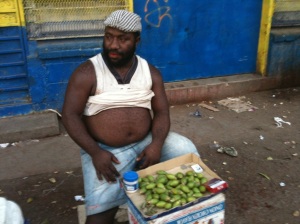
For some reason, cigarettes are usually sold at the same stalls. Maybe they are the centres of vice for the local community. The third component of this trilogy of rampant self-destruction is of course Maggi instant noodles.
The effect of the betel nut is enhanced by adding lime, which in PNG they call “kambang”. The street sellers all have the nuts and lime for sale and they usually have a type of mustard (to which the lady is pointing in this photo below), which I am told is just added for taste. The drug has a similar effect to nicotine and coffee, as I understand it. It leaves the mouth very dry but gives one a mental boost. It also allegedly improves bad breath. Personally, I think I’d rather tolerate a little morning breath from people than these scary-ass red teeth that I see everywhere.
Indeed, this popular indulgence comes at a tremendous cost to society. Firstly, betelnut is carcinogenic. It causes damage to gums, heart disease, and also cancer of them mouth, pharynx and stomach. The lime is also caustic and increases the chances of contracting cancer. Expectant mothers who chew during pregnancy cause effects similar to the use of alcohol or tobacco during pregnancy.
Despite all this, the use of betelnut is very widespread in Papua New Guinea. I suspect that people have no idea just how dangerous it is. I have seen children as young as 10 or 12 chewing betelnut or with the tell-tale red stains on their teeth. They are usually embarrassed to open their mouths for photos when they are betelnut addicts because of their stained teeth. Like this girl, when I asked to take her picture this morning.
Another unfortunate byproduct of buai consumption is that the husks are usually discarded in the nearest gutter.
But the most charming element of this ancient practice is that the nut, once chewed, is then spat out on the ground. It dries and leaves unsightly stains everywhere – particularly on the roads and footpaths around town. For that reason, many places ban the chewing of betelnut altogether. All this spitting around the place does nothing to help control the spread of tuberculosis, which by now we all know is caused by witchcraft and sorcery.
In fact, there was a blitz by law enforcement in the lead-up to the recent Royal visit by Prince Charles and Camilla Parker Bowles. When I arrived there was no betel nut for sale near my office and none on the ground either. Now that the enforcement has ceased, the vendors have crept back in and the place looks like a disaster zone once again.
This sign in Pidgin English says “Noken Kaikai Buai”. Noken means “it is forbidden to” (no-can). Kai [rhymes with bye] is the word for food and kaikai is the verb to eat. Buai is beetlenut. So this is the equivalent of a “No smoking” sign.
Of course, all of this seems rather distasteful and illogical to me. But before I become too judgemental, I am forced to remember my own weaknesses and my occasional consumption of coffee and alcohol (both also carcinogenic and often teeth-staining). There are a couple of other big events coming up in Port Moresby in the next year or so, including an ASEAN meeting and a major sporting event called the South Pacific Games. So there is hope that the betelnut will disappear again, at least for a little while.
To close today, I have also posted this picture of a mobile (cell) phone that I saw in a shop this week. Perhaps it is a top secret model from Research in Motion, that is not yet on sale in Canada.

